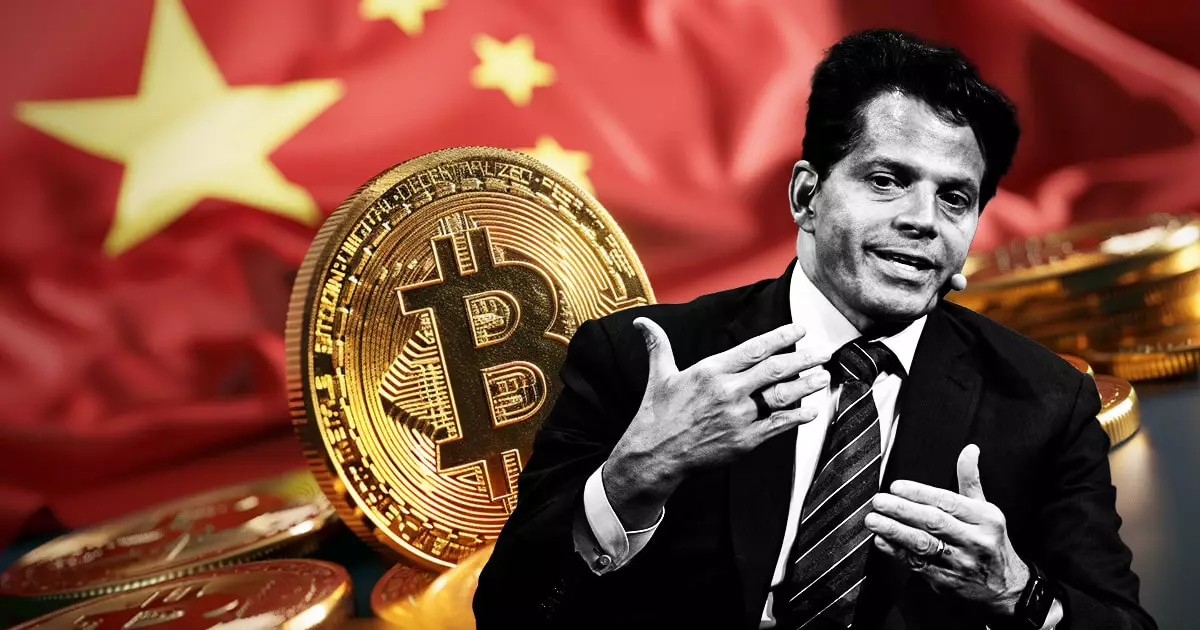As the world evolves, the perception of Bitcoin as an asset is undergoing a significant transformation. Recent remarks by Anthony Scaramucci during the Bitcoin MENA 2024 conference spotlight the increasing possibilities for countries, particularly China, to recalibrate their financial strategies with Bitcoin at the center. Scaramucci’s perspective emphasizes that the United States’ emerging acceptance of Bitcoin may compel other nations to reconsider their positions on this cryptocurrency, hinting at a wave of geopolitical shifts that could redefine the asset’s significance in global finance.
China’s Potential Return to Bitcoin Mining
Scaramucci boldly projected that within the next year, China could once again embrace Bitcoin mining and possibly integrate the cryptocurrency into its official reserve assets. This idea is particularly provocative, given China’s previous stance against cryptocurrency activities. With the U.S. adopting a more favorable attitude toward Bitcoin, it opens the door for other nations to follow suit—or risk being left behind in the rapidly changing financial ecosystem. The implication here is critical: major shifts in Bitcoin policy across the globe could reshape how governments perceive its strategic value.
Global Interest in Strategic Bitcoin Reserves
This year has witnessed a notable surge in global interest regarding the establishment of Bitcoin reserves among various nations. From Russia’s bold proposal for a national Bitcoin reserve aimed at counteracting international sanctions to Brazil’s legislative efforts to allocate substantial portions of its reserves for Bitcoin investments, countries are exploring this digital asset as a viable means to navigate the complexities of the current economic climate. The allocation of reserves to Bitcoin is increasingly viewed not just as a speculative investment but as a method of fostering financial resilience.
In the United States, discussions surrounding Bitcoin reserves are gaining traction. Scaramucci’s comments come at a pivotal moment when federal and state entities are deliberating over policies that could formalize Bitcoin as part of their reserves. Following President Donald Trump’s assurance to uphold existing federal laws related to Bitcoin, there is a growing consensus that Bitcoin might play a crucial role in the U.S. financial strategy. This sentiment is echoed by Senator Cynthia Lummis’s proposed legislation aimed at creating significant Bitcoin reserves over the coming years. Such endeavors underscore a strategic approach focusing on long-term gains rather than mere speculation.
The dynamics of the Bitcoin market are also evolving in response to these geopolitical developments. Following notable events like the Bitcoin halving in April 2024 and the impending U.S. presidential elections in November 2024, Bitcoin has exhibited resilience, maintaining a steadiness around the $97,000 mark. The alignment of these political and market events highlights Bitcoin’s potential shift from being regarded solely as a speculative asset to being viewed as a crucial component of national financial infrastructure. Corporations, including major asset managers like BlackRock, have expressed interest in endorsing the notion of a strategic Bitcoin reserve, illustrating the growing institutional involvement in this space.
Despite the optimistic views regarding Bitcoin’s capabilities as a hedge against inflation and a tool to counter economic sanctions, skepticism still exists. Critics raise concerns over the inherent volatility of cryptocurrencies and the potential for wealth redistribution from taxpayers to Bitcoin holders. These debates are crucial as they pertain to the prudence of allocating public resources to support such a high-risk asset. However, faith in Bitcoin’s burgeoning institutional credibility continues to thrive, suggesting that the momentum toward large-scale integration into national asset pools is far from slowing.
With leaders like Scaramucci projecting a re-entry of major powers such as China into the Bitcoin arena, the narrative surrounding Bitcoin is shifting dramatically. The combined openness of the U.S. toward Bitcoin and the proactive stance taken by various countries depict an evolving acceptance of Bitcoin’s role within national financial architectures. As this progression unfolds, the question remains: will Bitcoin consolidate its position as a strategic asset in global finance, or will the risks that accompany such a shift overshadow its potential benefits? The next few years will be pivotal in addressing these questions, as governments around the world explore new horizons in the realm of digital currency.


Leave a Reply